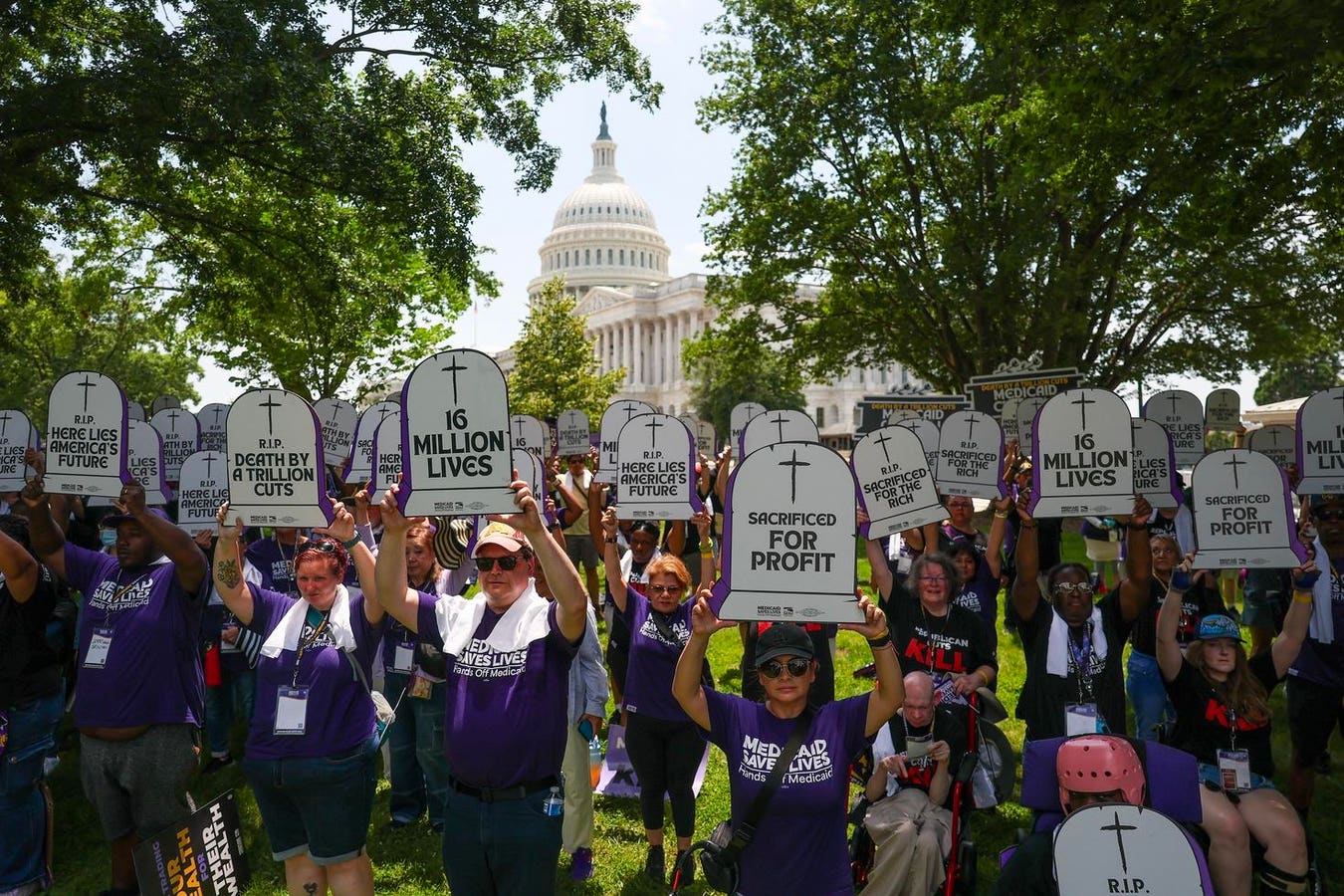Care workers with the Service Employees International Union (SEIU) participate in a living cemetery … More
News government-subsidized health insurance provider Centene is withdrawing its 2025 financial guidance comes as the Republican-controlled Congress is poised to slash hundreds of billions of dollars in funding to Medicaid and Obamacare markets largely administered by health insurers.
Centene’s announcement Tuesday was only the latest from a parade of health insurance companies that have struggled in the last two years to control costs of subscribers in plans subsidized by the government. And these problems could get worse if the Republican-controlled Congress passes a budget that is projected to roil a private health insurance market that in recent years has become more involved in providing health benefits to Americans.
Already, UnitedHealth Group in May suspended its financial outlook for the rest of the year and replaced its top executive as the parent of UnitedHealthcare grapples with rising healthcare costs in its Medicare Advantage business. Medicare Advantage plans contract with the federal government to provide health benefits to seniors.
Medicare Advantage plans also contributed to struggles last year for Humana and CVS Health, which elevated a new chief executive in part to help gain control of its struggling Aetna health insurance business. CVS is also exiting the individual health insurance business, leaving about 1 million Aetna members in 17 states looking for new coverage in 2026.
In Centene’s case, market growth in more than 20 states where it sells individual coverage under the Affordable Care Act, also known as Obamacare, is “lower than expected” and those enrolled in plans are essentially sicker than the company anticipated. The hit to Centene’s earnings will be at least $1.8 billion, or $2.75 per share, the company said.
Meanwhile, Centene is seeing higher cost trends in its Medicaid business. Centene contracts with states to administer Medicaid benefits to millions of Americans.
“The company’s Medicaid business has experienced a step-up in medical cost trend in the same areas previously identified by the company: behavioral health, home health and high-cost drugs,” Centene said Tuesday as part of its announcement pulling its 2025 guidance. “These dynamics were more pronounced in specific geographies, such as New York and Florida, including carve-ins of related services without sufficient rate or risk adjustment. Accordingly, the company expects the second quarter 2025 Medicaid Health Benefits Ratio (HBR) to be higher than the first quarter 2025 Medicaid HBR.”
Health insurers expect troubles will worsen if the U.S. House of Representatives passes the budget bill Republicans in the Senate narrowly approved on Tuesday. The nonpartisan Congressional Budget Office estimates the budget bill would lead to nearly 12 million Americans losing health insurance coverage over the next 10 years.
“The combined impact of the policies in the bill will destabilize state Medicaid programs and undermine countless local health care systems,” the trade group and lobby America’s Health Insurance Plans (AHIP) said in a statement Tuesday. “Due to new red tape and barriers to enrollment and re-enrollment, people losing eligibility for Medicaid will find an individual market with less choice and higher premiums. The potential expiration of the current health care tax credits later this year would compound the disruption.”
AHIP, which includes Centene, CVS and Humana as members, said the policies in the legislation that passed the Senate “could result in the biggest rollback in health care coverage in the country’s history.”
“That would mean millions of American families lose affordable access to primary care and pharmacies,” AHIP said. “The emergency room – the costliest and least coordinated site of care – would become the front door of the health care system for millions of people. The bulk of these costs would simply shift to uncompensated care payments and to those who are insured.”









